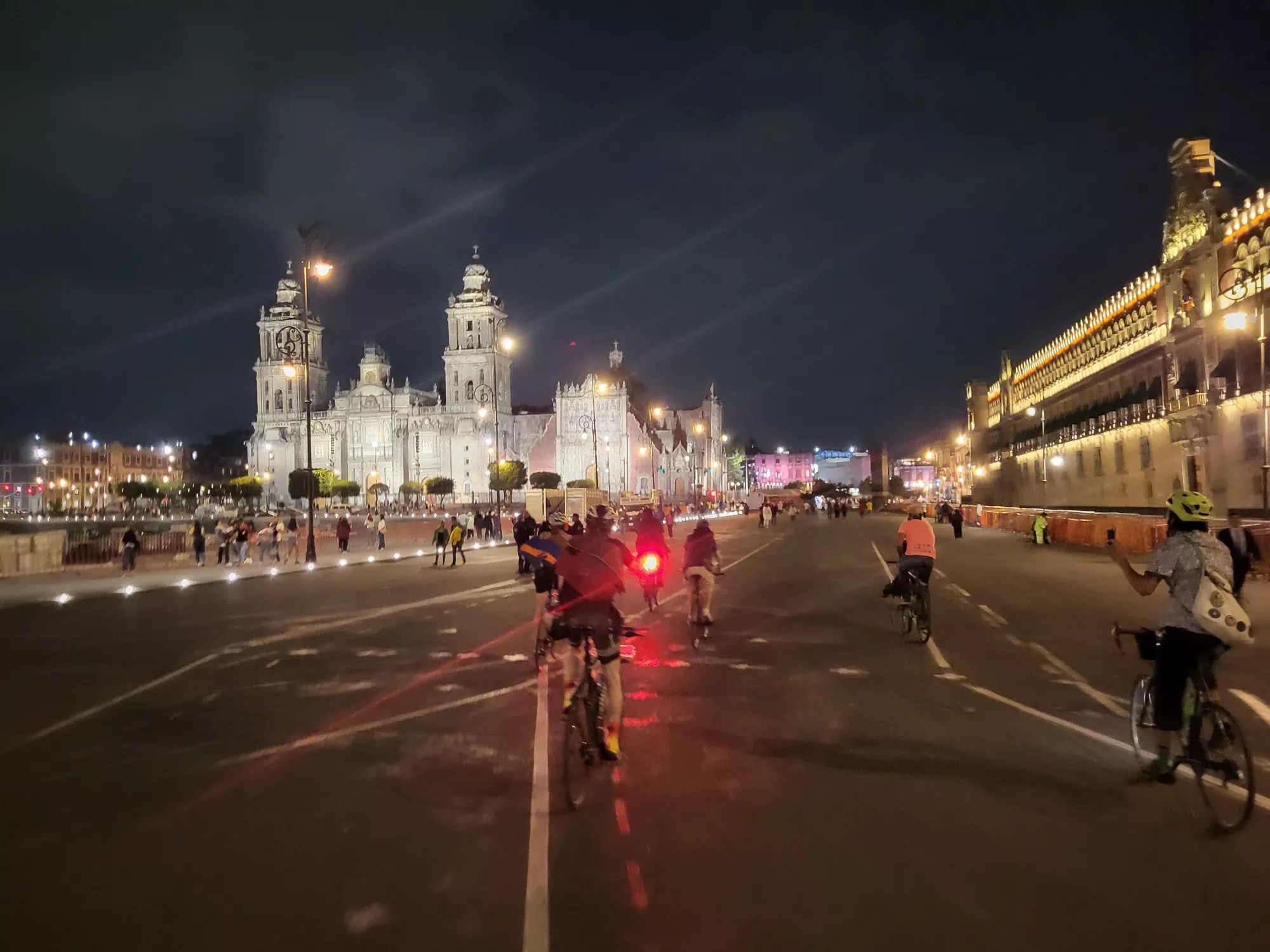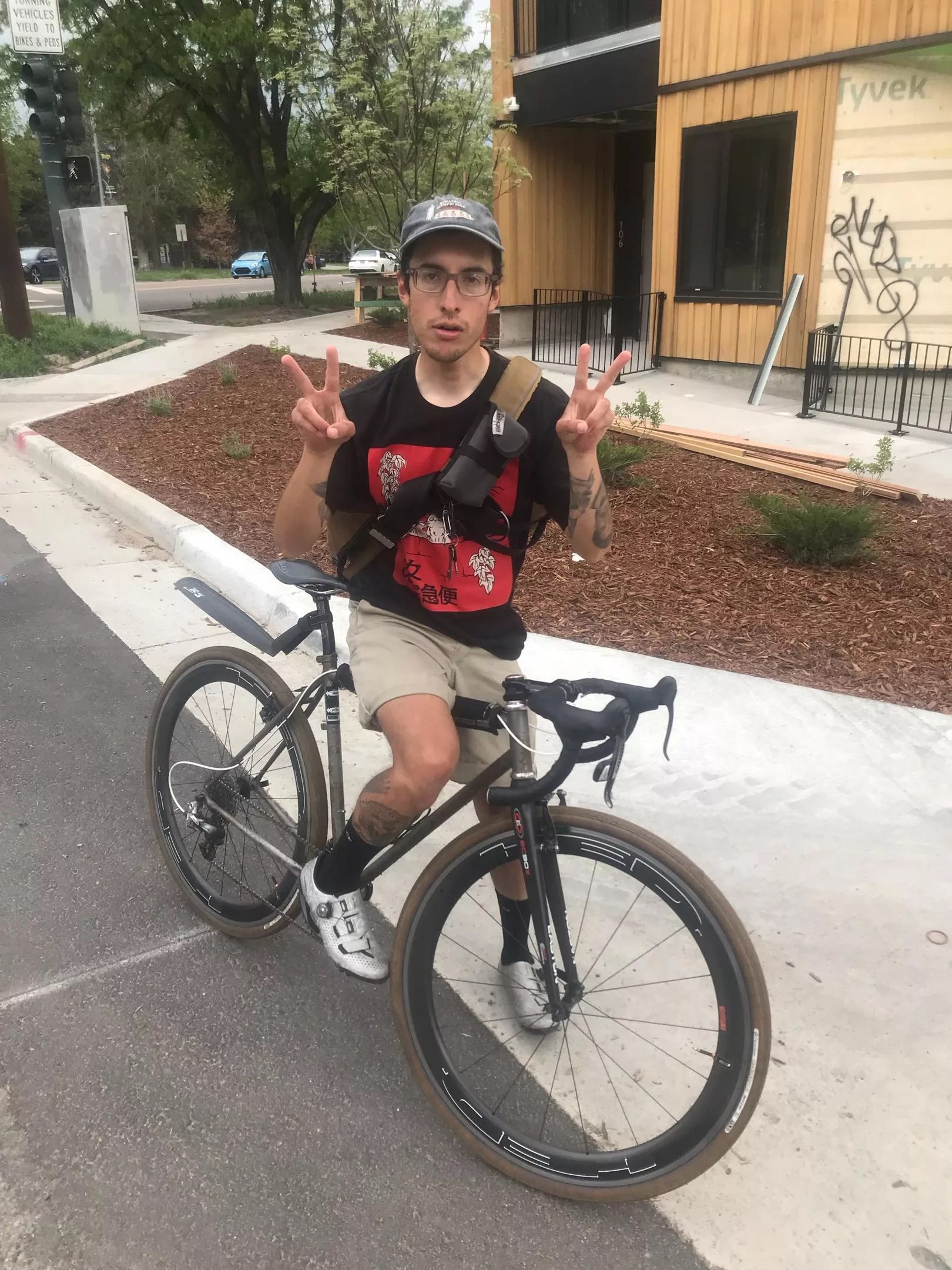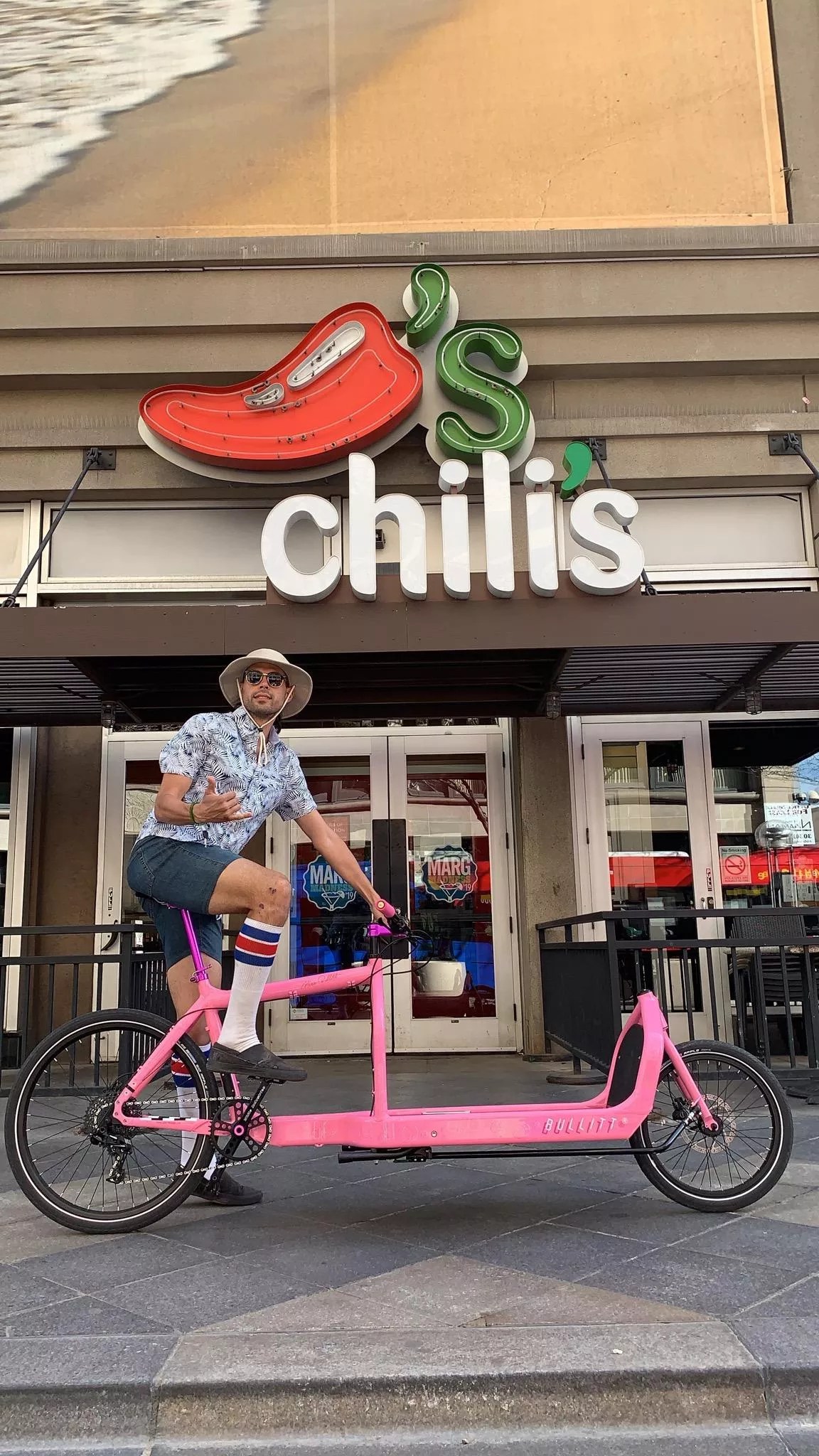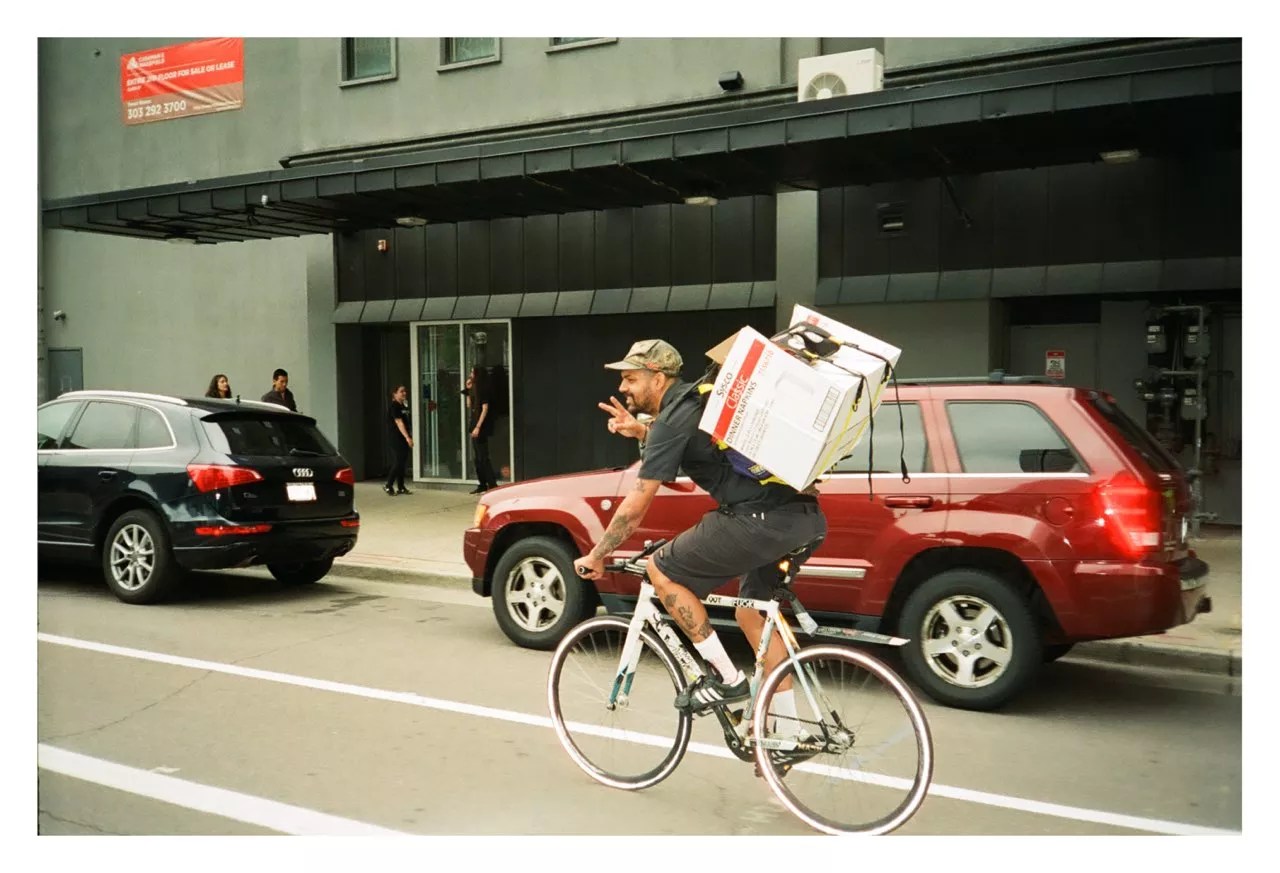
Matt Sanchez

Audio By Carbonatix
Matt Sanchez got the call to deliver a cake to a hospital to celebrate the birth of a baby. When he arrived at the bakery, it was clear the bakers had no idea that the elaborate cake they’d put so much time into would be transported by a bike messenger. For his part, Sanchez had no idea the cake would be so big…or expensive.
“It was one of the scariest loads I ever got. I had to do a $400 cake in rush-hour traffic,” Sanchez recalls. “I had to look at this and problem-solve in real time and figure out, ‘How am I going to keep this thing level?'”
He managed, though, and delivered the cake safely to the new parents – but not without a lot of stress…and pothole dodging. Still, it was all in a day’s work for a champion bike messenger.
Twenty years ago, there were dozens of bike messengers working in Denver, delivering everything from million-dollar checks to sandwich orders. But gone are the days when they’d gather at a bar at the end of a long day, swapping stories. Today, Jesus Mena, Antonio Janifer and Max Cass are the only Denver bike messengers who focus on delivering paper – the more traditional role of the courier. Sanchez, who used to deliver paper, now mainly does food delivery for Jimmy John’s, joining a handful of other meal-delivery bicyclists.
“Before the pandemic, there were at least fifteen of us,” says 31-year-old Mena. “In the early 2000s, there were still like fifty guys here and there for different companies. In the ’90s at one point, I was told, there were over 100 guys.”

Jesus Mena traverses much of Denver in a day working as a bike messenger.
Max Cass
Mena works for Quicksilver Express Courier, which does work in six states. The company used to have a crew of ten bike messengers in Denver. Now there’s only enough work for him. “I have to literally run all of Denver, like the whole damn thing,” Mena says. “I don’t know what the mileage is. I really haven’t put much thought into it, because I honestly don’t want to know.”
After being laid off briefly during the pandemic – when few people were working in downtown offices and everything that could be sent digitally was – Mena is just grateful he’s able to work as a courier. There’s still a place for messengers, he says…just a smaller place than before.
“The people that are left are just so dedicated,” says Sanchez. “We just love it. I mean, I couldn’t imagine doing anything else.”
“There’s still a very big need for hand-off deliveries where you need to go to a law firm and get a straight-up hard signature from somebody,” adds Cass, who works for Denver Boulder Couriers and has been on the job for a decade. “All the old-school attorneys downtown and old-school secretaries that have been downtown for a long time, they know exactly what we’re doing.”
Having a trustworthy person to handle key documents and command attention can be much more effective than an email. “I don’t like serving people papers,” Cass admits, adding that he was once held at gunpoint when he served papers to a person who owed child support and wasn’t happy about it.
Before switching to Denver Boulder Couriers, Cass would transport forty or fifty prescriptions a day during the pandemic. Mena still does a lot of medical work. He takes prescription orders to pharmacies and transports scans and blood samples from one medical professional to another; sometimes he even takes bills from Denver Health to people’s homes. Before the pandemic, about 20 percent of his work was medical; today it’s about 90 percent, he says.
Sanchez, who grew up in Brighton, started working as a bike messenger as a summer job when he was a music teacher. But he’s been a full-time courier for about a decade – and last November, he competed in the annual North American Cycle Courier Championships, held in Mexico City.
About 200 bike messengers competed in the NACCC. “I’m half Mexican; my dad was born in Chihuahua,” Sanchez says. “It was so meaningful to me to go and really meet and get to know the messengers down there.”
The contest consisted of a series of five races, three of which were held on Mexico City’s streets with various fake pick-ups and drop-offs that simulated a day of work in the life of a bike messenger. “The finals race this year had ten set checkpoints on a course, and you had to deduce with the manifest what order you wanted to hit these checkpoints,” Sanchez recalls. “Realistically, I’m not the fastest bicyclist in North America, but I was able to look at that and run a more efficient race than anybody else. It’s not only an athletic feat, but it’s also very much a mental game.”
Sanchez wasn’t expecting to win. He’d competed years earlier and figured that now, at 35, he might have an even poorer showing. But he won the competition.
The big prize, though, was enjoying the camaraderie in an industry that few people realize still exists.

Matt Sanchez has several different bikes he uses for his job — and for fun!
Matt Sanchez
“I know virtually everyone on the streets here, and I know people who used to be on the streets,” Sanchez says. “I mean, you don’t see fishermen traveling from all over North America to have a skills competition in one city and have this built-in community. But you do with bike messengers. I could show up to any city and find a friend of a friend, and before you know it, I’m taken in.”
His attention to mental strategy that won him the NACCC is also what’s helped him find success in Denver. Messengers work with dispatchers who let them know what orders they have to complete. From there, they have to figure out the most efficient route.
“When I was originally hired, I was informed that I am being paid to be faster than cars,” Sanchez says. “That is my sole purpose. If I cease to be faster than cars, I no longer have a purpose. The idea of being the bike messenger is being there to take the stuff where there’s no parking, where there’s traffic, or where it’s too congested for a car.”
Cass says that newer food delivery people don’t understand that the job isn’t always about speed; it’s about keeping up a good tempo while avoiding getting hurt.
“I’ll go in a big loop,” he says, usually starting his day at the post office downtown. “If I have stuff that’s just central downtown, I knock that out and then I have to go to Uptown and knock that out, and then I have to go to, like, Glendale or South Colorado Boulevard, stuff like that. … I’m always working in some sort of a route situation where I’m not going here and then, ‘Oh shit!’ I have to go way back down there.”
When a courier gets his sequence of drop-offs just right, it’s satisfying.
“It’s almost like a flow state,” Sanchez says. “You’re in the middle of the chaos, but you’re never quite fully attached to it. You’re trying to find the most efficient way to cut through it. It’s honestly a really joyful process.”
Unlike Mena, Sanchez tracks his miles. He says that a typical day ranges from 45 to 65 miles, with rare heavy days pushing toward 70 or 80. Traversing all those miles gives these messengers a view of downtown Denver that most will never have. When he starts his day early, Sanchez, says, he’s seen coyotes on downtown streets that have wandered up from the South Platte while things were quiet.
That contrasts with the traffic and wanderers the messengers often encounter. In his fourteen years as a messenger, the number of people living on the streets has definitely increased, Janifer says. Though the early stages of the pandemic were rough for the industry, he was able to keep working – and even when the only other people he saw downtown were those experiencing homelessness, he never felt unsafe.

Like his fellow messengers, Antonio Janifer has seen Denver change a lot over the years.
Antonio Janifer
Mena grew up in Boulder and still lives there, taking the bus down to Denver every day for work. From his perspective, downtown has changed for the worse because of development and rising costs leading to the displacement of longtime businesses.
“I’m like, ‘Oh, that place is gone and that place is gone,” he says. “Denver has always had a lot of potential, but I think a lot of people just didn’t know what to do with it. They kind of squandered it.”
Cass, who grew up in Capitol Hill and still lives there, agrees. He says downtown quickly changed from being affordable to being filled with new, expensive places with less character. His own rent has doubled in the last decade.

Cyclists like Max Cass know their way around downtown Denver.
Max Cass
But there are still people and places who have kept the downtown he knew going, Cass says. He and the other paper messengers know all the security guards who will let them hang out in building lobbies on cold days or share leftover food from corporate events. All four messengers mention restaurants that are always happy to see them.
One thing they haven’t been too happy to see: more protected bike lanes, which they say aren’t compatible with their work – especially when winter runoff from buildings or lazy shovelers who dump their snow into the street make the lanes hazardous.
However, both Sanchez and Cass acknowledge that for casual riders or commuters, there are advantages to the improved infrastructure. “I like seeing the attention Denver’s putting into it,” Sanchez says. “Is it perfect? No. But is it a cool thing to see? Yes.”
Janifer says he often zips through alleyways or hotel valet areas not just to stay out of contact with cars, but also to avoid getting stuck in a bike lane. Sanchez has perfected adjusting his speed so that he’s never caught at a light at 15th or 17th street. And Mena has become an expert at knowing where to avoid construction.
“I know all the alleys,” Cass says. “I know every crack in the sidewalk.”
All four say they love their gigs, despite the challenges. Sanchez jokes that he actually annoys other people because he wakes up every day happy to go to work, something that isn’t the case for many.
They all feel privileged to have this job…while it still exists.
“I’ve had this conversation with another guy that I worked with,” Mena says. “I was like, ‘I think we’re the last generation to really do this the old-fashioned way.’ … That’s why I personally keep on going, because I know there’s going to be one day that there’s not going to be any bike messenger work to do, and I’m going to regret not doing everything I could have done when I could have.”
This story has been updated to correct information about Sanchez’s championship (North American, not world) and also to note the difference between paper couriers and bike messengers who focus on food deliveries.